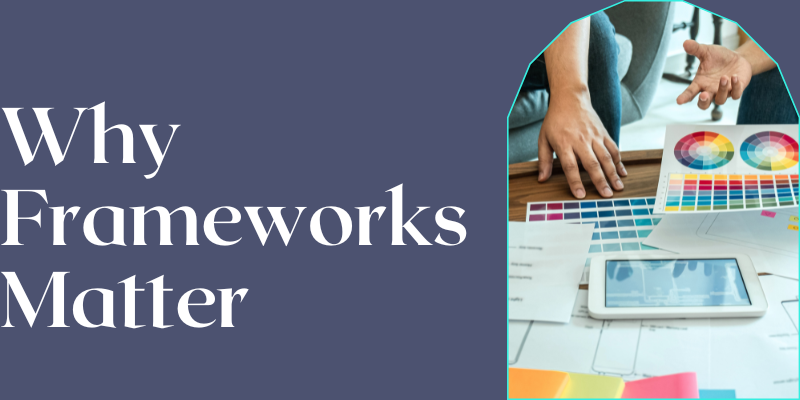Framework- Essential Tools for Modern Application Building
Published: 24 Apr 2025
In the rapidly evolving tech world, developers often seek efficiency, reliability, and consistency, which is where frameworks shine. A framework is more than just a collection of reusable code- it’s an essential development tool that provides structure, speeds up coding, and ensures high-quality outcomes. Whether you’re building a simple blog or a full-scale AI application, the right framework can streamline your entire development process.
When I first transitioned from manual coding to using Django, I was amazed by how much faster I could build secure, scalable applications. It felt like going from drawing every brick of a house to using pre-designed blocks. My productivity soared-and so did the quality of my code.
What Is a Framework?
A framework is a structured environment that simplifies application development by providing reusable code, libraries, and design patterns. Developers rely on it to write less code and ensure consistency across multiple projects. Popular examples include React, .NET, and Django-each designed to solve specific development challenges.
Quick Facts:
- What is it? A predefined structure for building applications efficiently.
- Core Feature: Offers reusable code and design consistency.
- Purpose: Reduces development time while maintaining high standards.
Metaphorical Explanation
Think of a framework like a house blueprint. You don’t need to design every wall or wire from scratch. Similarly, a framework gives developers a ready-made structure to create robust software faster and more efficiently.
Why Frameworks Matter
Frameworks reduce complexity, speed up development, and foster collaboration.

They provide a standard foundation so developers can concentrate on solving business problems and adding unique features rather than rewriting boilerplate code.
Benefits at a Glance:
- Efficiency: Eliminates redundant coding.
- Consistency: Enforces standardized practices.
- Scalability: Allows for future expansion with ease.
- Productivity: Reduces time-to-market significantly.
From personal experience, adopting frameworks transformed our team’s workflow. In a college hackathon, using Flask allowed us to build and deploy a full-stack project in under 24 hours-something unimaginable without a solid framework.
Frameworks and the Future of Development
With the rise of AI and IoT, frameworks are more critical than ever. Tools like TensorFlow are driving innovation in machine learning, while modular devices like the Framework Laptop echo software principles of adaptability and user control.
How Frameworks Work
Frameworks provide a set of integrated tools that work under predefined architecture, such as the MVC (Model-View-Controller) pattern.
Common Elements:
- Libraries
- Modules
- APIs
- Templates
Step-by-Step Breakdown:
- Structure: Provides modules and reusable code.
- Patterns: Encourages MVC and other architectural practices.
- Integration: Developers insert their logic within the given structure.
- Automation: Handles repetitive tasks like UI generation and DB queries.
Real-World Examples
- React: UI component-based JavaScript library.
- .NET: Robust framework for enterprise apps.
- Django: Handles backend operations with ease.
- Bootstrap/Yii: Frontend templates and backend automation.
Common Misconceptions About Frameworks
Frameworks are only for large projects
Reality: Even small apps benefit from the structure and speed provided.
Frameworks limit creativity
Reality: They actually free developers to focus on creative, high-value features.
Troubleshooting Framework Challenges
Common Issues:
- Version Conflicts
- Dependency Errors
Expert Tips–
- Always use stable versions (e.g., upgrade from .NET 4.8 to .NET 7.0).
- Regularly update packages and check documentation.
Types of Frameworks
Frameworks has many types.

Main Categories:
- Web Frameworks: React, Angular, Flask
- Mobile Frameworks: Flutter, Swift, React Native
- Game Frameworks: Unity, Unreal Engine
- AI Frameworks: TensorFlow, PyTorch
- Backend Frameworks: Django, Express.js, .NET
Industry Applications of Frameworks
Who Uses What?
- Web Developers: Angular for dynamic SPAs
- App Developers: React Native for iOS and Android
- AI Engineers: TensorFlow for deep learning
- Educators: Moodle for online learning systems
Frameworks in Key Sectors–
- Web: Vue.js, Bootstrap
- Mobile: Flutter, Xamarin
- Gaming: Unity, Unreal Engine
- AI: TensorFlow, PyTorch
- Enterprise: Spring, Laravel
Specialized Use Case- AI & Machine Learning
Frameworks like TensorFlow revolutionize ML by handling complex computations and model training efficiently. Combined with cloud services, they empower global research collaboration.
Advantages and Disadvantages of Using Frameworks
| Advantages |
|---|
|
| Disadvantages |
|---|
|
Initial learning curve Less flexibility in architecture |
Conclusion
Frameworks are powerful tools that simplify coding, improve efficiency, and help you build scalable, professional applications. Whether you’re developing websites, apps, secure web browsers, or AI projects, choosing the right framework can accelerate your growth. Start exploring tools like React, Django, or .NET to enhance your skills and bring your ideas to life. The right framework can turn challenges into opportunities and learning into real-world success.
FAQs
Yes! Frameworks help beginners build real-world apps faster and teach good coding habits from the start. They’re like using training wheels-you’ll learn better and faster.
A library gives you tools to use, but you decide how to use them. A framework gives you structure-it tells you where to put your code and how things should work together.
Yes! Frameworks like Flutter and React Native are made for building mobile apps. You can even create one app that works on both Android and iOS.
Not at all. Frameworks handle boring, repetitive tasks so you can focus on the creative parts of your project. They free up your time and energy for innovation.
It depends, but most people can start building simple projects in 1–2 weeks. The key is consistent practice and building small apps to learn as you go.
No, they’re for everyone! From students building school projects to companies building apps, frameworks help all levels of developers write better code faster.
MVC stands for Model-View-Controller. It’s a way to organize your code- the Model handles data, the View handles what users see, and the Controller manages how it all works together.
Yes, but it’s best to keep it simple at first. Once you’re more confident, you can combine frontend and backend frameworks like React (frontend) with Django or Express.js (backend).
Absolutely! Big companies like Google, Netflix, and Facebook use frameworks like Angular, React, and Flask to build their platforms. Learning one gives you real-world job skills.

- Be Respectful
- Stay Relevant
- Stay Positive
- True Feedback
- Encourage Discussion
- Avoid Spamming
- No Fake News
- Don't Copy-Paste
- No Personal Attacks

- Be Respectful
- Stay Relevant
- Stay Positive
- True Feedback
- Encourage Discussion
- Avoid Spamming
- No Fake News
- Don't Copy-Paste
- No Personal Attacks




